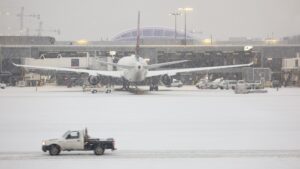Winter Storm Causes Travel Chaos: Over 3,000 Flights Canceled
At the heart of today’s severe winter storm, Atlanta’s Hartsfield-Jackson International Airport—the busiest airport in the world—finds itself grappling with significant operational challenges. On January 10, 2025, snow blanketed the area and wreaked havoc on travel plans across the Southern U.S. As a result, airlines had to cancel more than 3,000 flights, while over 4,000 flights faced delays.
Delta Disruptions and Emergency Evacuations
A critical incident unfolded involving a Delta Air Lines Boeing 757-300, which was forced to halt takeoff due to an engine issue just after 9 a.m. Fortunately, the flight, destined for Minneapolis-St. Paul, had an experienced crew that swiftly followed established emergency procedures. All 201 passengers and seven crew members were evacuated via emergency slides, highlighting the importance of safety in aviation. Although four passengers sustained minor injuries—one requiring transportation to a hospital—the swift action of the crew ensured further risks were mitigated.
The Federal Aviation Administration (FAA) has since launched an investigation into this incident, emphasizing that even minor mechanical issues can have serious repercussions, particularly during adverse weather conditions.
As data from flight tracker FlightAware indicates, approximately 1,100 flights were canceled in and out of Atlanta—a staggering figure that accounted for more than half of the day’s flight schedule. A ground stop was instituted to prevent the airport from becoming overwhelmed, showcasing how critical ongoing communication and operational protocols are during severe weather events.
Broader Impacts on Southern Travel
The storm’s effects weren’t limited to Atlanta. Two major American Airlines hubs, Dallas Fort Worth International Airport and Charlotte Douglas International Airport, saw their share of cancellations as well, reporting more than 1,200 flights affected. This level of disruption illustrates a broader trend in aviation where weather-related interruptions can cascade through connecting flights and networks.
In response to the severe weather, several airlines, including Delta, Southwest, and American, waived change fees and fare differences, allowing stranded travelers some flexibility as they attempted to reroute their journeys safely.
Unique Insights for Travelers
As the Extreme Investor Network, we believe in empowering our readers with unique insights into how to navigate such disruptions. Here are a few strategies you can use to manage travel plans during severe weather events:
-
Stay Informed: Utilize real-time flight tracking apps to keep updated on any changes to your itinerary. Social media platforms can also provide timely information from airlines.
-
Understand Airline Policies: Familiarize yourself with the policies of your airline regarding cancellations and delays. Knowing your rights can help you advocate for yourself in challenging situations.
-
Pack a Carry-On: If you’re anticipating travel in bad weather, ensure you have essentials in your carry-on, including medications, a change of clothes, and some snacks.
-
Consider Travel Insurance: For those who frequently travel during unpredictable seasons, investing in travel insurance can offer additional peace of mind.
- Flexible Travel Plans: If you know adverse weather is forecasted, consider booking flexible travel plans that allow you to adjust your itinerary without substantial penalties.
As we continue navigating the unpredictability of air travel amid weather challenges, remember that being prepared and staying informed are your best tools for a smooth journey. Stay tuned to the Extreme Investor Network for more insights and updates on travel and business news that matter to you.

